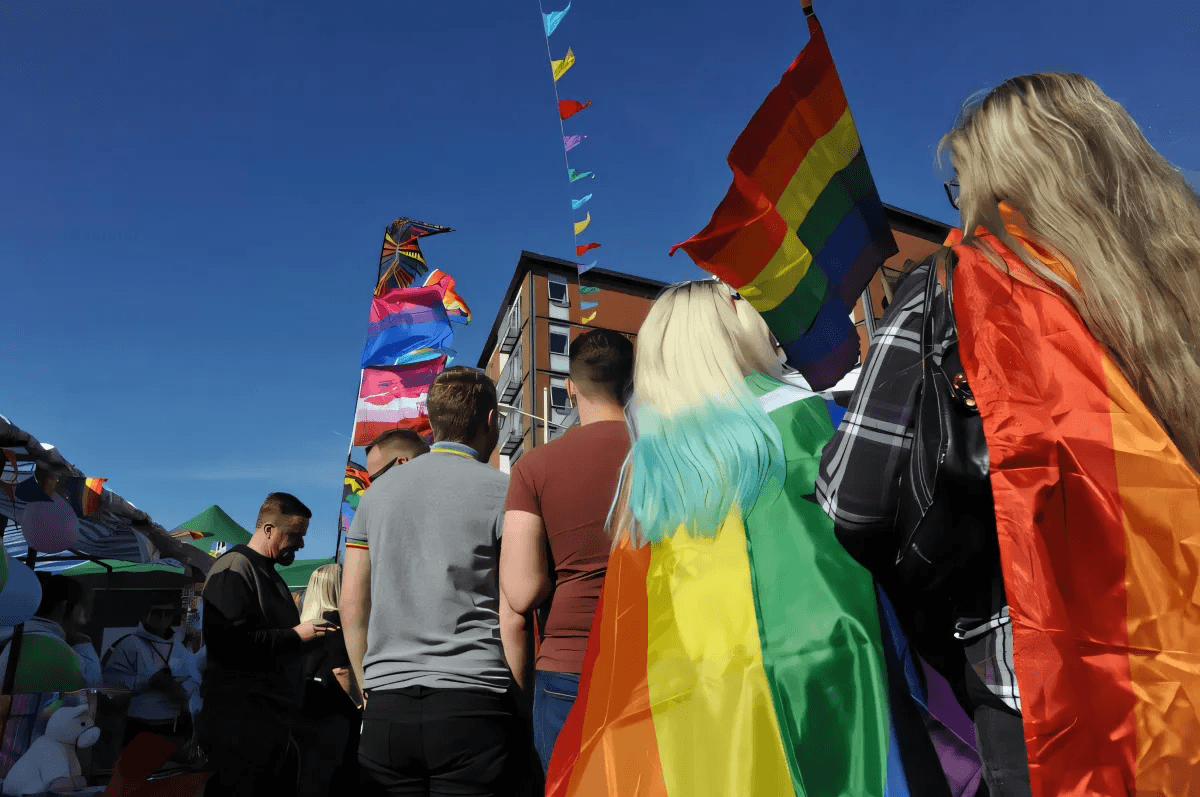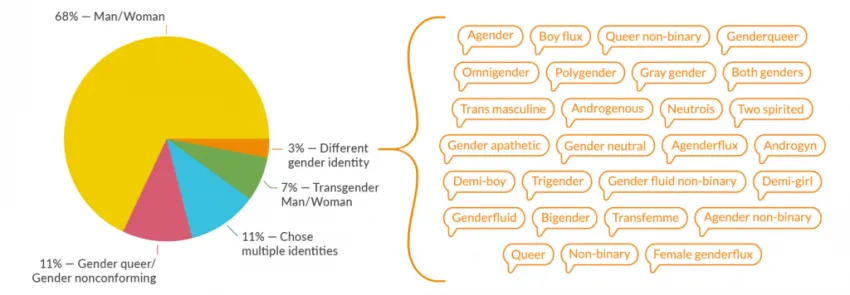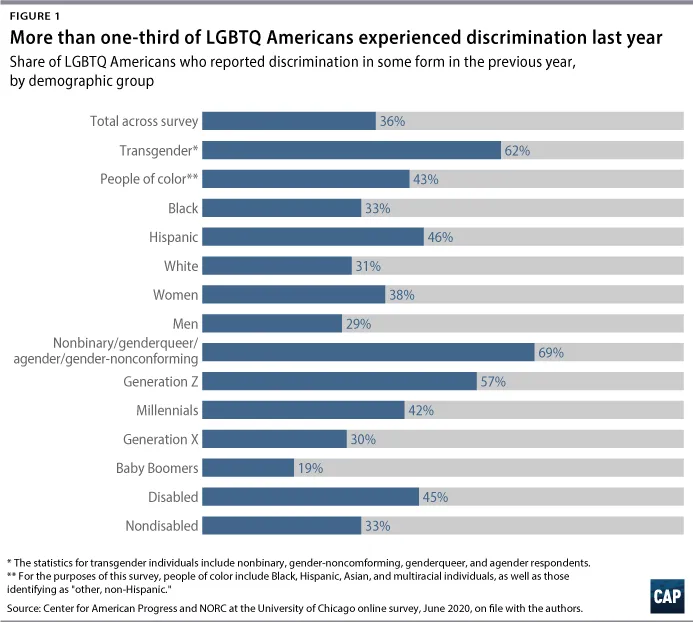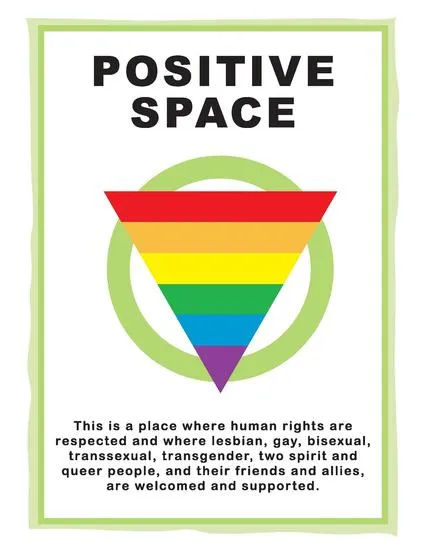Do's And Don'ts Of Supporting Your LGBT+ Loved Ones

What LGBTQIA+ Really Means
Understanding the LGBTQIA+ community boils down to understanding two categories: gender and sexuality. Gender deals with the relationship with self, while sexuality deals with the attraction, or lack of attraction, toward others.
At its core, being part of the LGBTQIA+ community simply means that your gender identity or sexual orientation differs from heterosexual (feeling attraction solely towards the opposite sex) or cisgender (identifying as the gender you were assigned at birth). It’s an umbrella term that covers many identities.

The Trevor Project cites more than 100 combinations of terms that LGBT+ youth have used to define sexuality and gender. Since both gender and sexuality are fluid, these terminologies may overlap, change, or vary depending on who is asked to define them.
The main purpose of labels is to use language to authenticate individual experiences and to find others who identify the same way. Some people love using labels, while others hate to be defined. This is a personal choice, and while it can seem complex and confusing at first, it is important for many LGBT+ people to define themselves.
Why the LGBT+ community needs equality now
Equality is about being open and accepting of all people, regardless of gender or sexuality.
At this point in time, members of the LGBT+ community are facing discrimination in nearly all aspects of life. Being rejected by family members can lead to homelessness, abuse, and mental health issues. LGBT+ people are discriminated against in work environments, denied medical care, are mistreated by medical professionals, experience hate crime, are bullied in school, and are ostracized by religious communities.

These issues are global, and while progress is being made, the world still has a long way to go towards true equality and justice.
SafeZone: Supporting LGBT+ in Schools

Many students identify as LGBT+, and simple steps can be made to ensure they feel safe and accepted. In many cases, these students are unable to go to family members about their identity and fear telling their friends.
Letting students know that they are supported through simple and subtle ways, like hanging a safe-zone sign on the classroom door, addressing LGBT+ topics in classes, and refusing to tolerate hate speech or bullying can have a huge impact.
The Do's and Don'ts of supporting LGBT+ loved ones
The chances are high that you, or someone you love, identifies as part of the LGBT+ community.
As the world around us changes, and we learn more about identity and the human experience, more and more people are finding the language to express their identity. While this is an amazing step forward, it can be confusing as well.
Here is a list of important do’s and don’ts when it comes to supporting members of the LGBT+ community.
1. Do let members of the LGBT+ community know you love them
This is the most important step, even if it seems obvious. Unfortunately, our society is still prejudiced against the LGBT+ community, and many organizations and individuals will have no problem hating us without knowing anything about us besides who we are or who we love.
According to Stonewall UK, 1 in 5 LGBT people and 2 in 5 transgender people experienced a hate crime in 2018. Only half of the LGBT+ people are open about their identities within their families. LGBT+ people face discrimination in education, healthcare, and the workplace.
Show your loved ones that you care about and support them, no matter what. In a world still so full of hate, it makes all the difference.
2. Don't love LGBT+ members conditionally
The most hurtful phrase (that isn’t intended to be hurtful) an LGBT+ person can hear is “I can disagree with your lifestyle, but still love you”. This sentiment is unfair, and it doesn’t really make sense.
Gender and sexuality are not lifestyles we choose, but integral pieces of our identity. We aren’t deciding to be different; we’re embracing our truth.
Saying this implies that you only love the pieces of us that are acceptable to you and gives the impression that you could care about us more if only we were different or closed off the most honest, truest parts of ourselves. What you’re really saying is that you love us but don’t accept us. While you may feel like you’re being kind or fair with this compromise, it is actually incredibly harmful.
Instead, take a step back and evaluate your own understanding of the LGBT+ community. Having an open mind, and an open heart is the most important step in learning acceptance.
3. Do be respectful while learning more about the LGBT+ community
The conversation that comes from a mutually respectful and open place is a wonderful thing, and it can lead to understanding one another better and strengthening relationships. Talking about gender and sexuality is no exception. These are conversations that need to be happening, especially as our world continues to move towards true equality.
If your loved one is willing to educate and share about their experience, great! However, please don’t ask unless you are truly willing to learn. If you already know that your mindset is not going to change - that you will not accept your loved one’s identity regardless of what they say, it isn’t a conversation that will benefit either party.
The best thing you can do is be honest and sensitive with your questions, be open to listening, and trust that your loved one’s experience is valid and real.
4. Don’t argue against being LGBT+ based on religious or personal beliefs
This is a sensitive topic, but an important one. Everyone is entitled to their own beliefs, and your thoughts and opinions have value and shouldn’t be taken from you. Many people disagree with homosexuality due to their own religious beliefs and may feel like they need to make their concerns known for their friend or family member’s own good.
However. It is important to keep in mind that the person you’re planning on ‘talking out of’ being LGBT+ has already heard your point of view. It’s no secret that the relationship between LGBT+ and religion has always been rocky. This can be an incredibly sensitive topic that should be handled with care and empathy on both sides.
As I’ve stated, communication and honesty are deeply important. I don’t believe we shouldn’t be having conversations about religion and identity. But for a fair conversation, both parties must be willing to listen. If there is no consent and respect on both sides, the conversation will do more harm than good.
5. Don’t take it personally if your LGBT+ loved one didn't come out to you right away
Coming out is a uniquely vulnerable, and irreversible, decision. It can take years for someone to share this truth about themselves, even if they know that the reaction will be positive.
As stated by the Trevor Project, coming out being open about one’s gender or sexuality is unique to each individual. It doesn’t just happen once and shouldn’t define the validity of someone’s experience. While some people choose to come out to many people at once, usually through social media, there are many people who only come out to a trusted few, and even people who never disclose the information at all. This is all dependent on that person’s situation and what is right for them.
There’s intrinsically human fear of being known. Revealing something so personal and fundamental to our identity is a huge deal.
If your loved one is only now sharing this truth about themselves or if they seem to have told everyone else before you - please don’t take this as a personal offense or a lack of trust. Often, it is the people we love the most whose opinions matter the most to us.
6. Do accept that there are things you won’t understand about being LGBT+ – and that’s okay!
Everybody faces hardships in life. There will be things that your loved one has to deal with that you may never even think about, like debating whether or not it’s safe to show affection in public or being called by the wrong name or pronouns. These issues are unique to our community, and although we love and appreciate your support, we also understand that there are differences in our experiences. Please don’t feel like you must share our experiences in order to support and love us. Just being there is enough.
7. Don’t believe all media representation of the LGBT+ community
Representation on television and in movies isn’t always true to real-life experiences. If the only experience you have with gay people is through a screen, there’s absolutely nothing wrong with that. But keep in mind that these are characters written for entertainment purposes, not multifaceted individuals with their own identities and experiences.
In addition to consuming popular media...
8. Do check out resources from LGBT+ organizations!
Organizations like PFLAG, The Trevor Project, and Human Rights Campaign (links) exist to provide resources and information to the LGBT+ community and their families and friends. Education is the first step towards growth.
If you want to learn more, there are so many resources available to you!
Summary
Above all, if a family member or friend has come out to you recently, or if you’re looking for ways to be supportive, the most important thing is to treat them with the same respect and humanity that you would normally. LGBT+ people are just people, and while our gender and sexuality are important, they alone do not define us.
All in all, it is important to be mindful of your actions and your words and to treat the person you care about the same way you would treat anybody else. Continue to have discussions, learn more about the community, and keep an open mind and an open heart.
Opinions and Perspectives
Reading this helped me understand why some of my well-intentioned comments might have been hurtful in the past.
The suggestions for allies are practical and doable. Sometimes people overthink how to be supportive.
This reminds me why education and visibility are so important. You can't support what you don't understand.
Love that the article emphasizes how gender and sexuality are just parts of who we are, not our entire identity.
The section about workplace discrimination barely scratches the surface. We need stronger protections and better enforcement.
Great point about how coming out is different for everyone. There's no right or wrong way to do it.
Being told its just a phase was so harmful to my mental health. Glad the article addresses these kinds of misconceptions.
The article really nails why that love the sinner hate the sin attitude is so damaging to relationships.
Sometimes I feel overwhelmed by all the terminology, but this article helps explain why its important to so many people.
The point about media representation reminds me how far we've come, but also how far we still have to go.
Interesting how the article connects gender identity and sexuality while also explaining how they're different concepts.
The emphasis on open communication and mutual respect is key. We can't move forward without honest dialogue.
Im going to share this with my parents. They try to be supportive but sometimes say the wrong things without realizing it.
The section about safe spaces in schools could have included more practical tips for teachers and administrators.
I appreciate how the article emphasizes that its okay not to understand everything. Acceptance doesn't require complete understanding.
The statistics about youth homelessness and rejection by family members are devastating. We need more support systems in place.
This article perfectly captures why that I love you but I don't agree with your lifestyle comment is so harmful.
Reading this made me reflect on my own journey of acceptance. We all start somewhere, but we need to keep growing and learning.
The part about conditional love reminded me of my own coming out. Those but statements can really damage relationships.
I found the section about terminology really helpful. Learning the language helps me be a better ally to my friends.
The advice about not taking it personally if someone doesn't come out to you right away is so important. Trust takes time.
Interesting point about religious beliefs. My church has become more accepting over time, but it took a lot of difficult conversations.
The workplace discrimination part really hits home. I still hide who I am at work because I'm afraid it will affect my career.
Im glad the article mentions that some people don't like labels. We sometimes put too much pressure on people to define themselves.
Can we talk about how important that first point is? Just telling someone you love them can make such a difference.
Its refreshing to see an article that acknowledges the complexity of coming out. Its not a one-time event like movies make it seem.
The examples of discrimination in healthcare really concern me. We need better training for medical professionals.
This article made me realize I might have said some harmful things while trying to be supportive. Time to do better.
Not sure I agree about the media representation part. I think its getting better with shows actually hiring LGBT writers and actors.
The resources section is super helpful. I've found PFLAG meetings incredibly supportive for both me and my family.
Completely agree about not needing to understand everything to be supportive. Just being there and listening means so much.
The section about safe spaces in schools is great, but we need more concrete actions beyond just putting up signs.
Anyone else feel relieved when they read the part about taking time to come out? Thought I was the only one who told different people at different times.
This should be required reading for everyone. The basics here are so important for building understanding.
The part about conditional love really struck a chord. I'm tired of hearing I love you but from family members.
Thank you for addressing the religious aspect. It's possible to be both religious and accepting, but many people use faith as a weapon against us.
The article could have gone deeper into workplace discrimination. That's still a huge issue many of us face.
I wish more people understood that gender and sexuality can be fluid. Just because someone comes out as one thing doesn't mean it can't evolve.
The point about media representation is crucial. Most shows still rely on tired stereotypes instead of showing us as complex individuals.
As a parent, I found this incredibly helpful. My child just came out and I want to make sure I'm doing everything right to support them.
The section about coming out really hit home. I told my best friend last because I was terrified of losing them.
I actually disagree with some parts. I think we sometimes need to be more patient with people who are trying to understand, even if they say the wrong things at first.
The statistics about hate crimes are heartbreaking. We still have such a long way to go.
A lot of well-meaning allies need to read point 6. You don't have to understand everything to be supportive.
I work in education and the SafeZone section really spoke to me. Small gestures like putting up safe space signs really do make a difference for our students.
My family used that conditional love excuse and it took me years to understand why it felt so wrong. Thank you for putting it into words.
Anyone else find it frustrating when people say its just a lifestyle choice? Like you mentioned in point 2, this is who we are, not a choice we made.
The media representation point is spot on. We're not all walking stereotypes like TV shows portray us.
I struggle with understanding all the different terms and identities sometimes, but I'm learning that's okay as long as I remain respectful and open to learning.
The point about religious beliefs really resonates with me. I lost several friends who tried to pray the gay away from me. It hurt more than they probably realized.
I really appreciate how this article emphasizes the importance of unconditional love and support. As someone who took years to come out, having that support made all the difference in my journey.
